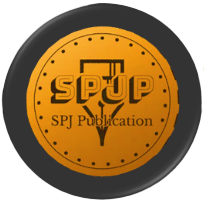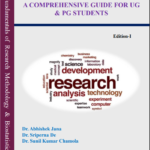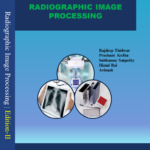![]()
![]()
![]()
![]() There is No APC For Research Paper Publication.
There is No APC For Research Paper Publication.
Publication Ethics for SPJ Publication
SPJ Publication adheres to the highest standards of academic integrity and ethical conduct in publishing. We aim to ensure that all our journals uphold ethical guidelines that promote transparency, accountability, and fairness in the publication process. This includes preventing unethical behavior, ensuring proper academic standards, and supporting the integrity of research. The following outlines our detailed publication ethics and guidelines for authors, editors, and reviewers.
1. Ethical Responsibilities of Authors
Authors are expected to adhere to the highest standards of research integrity. Their responsibilities include, but are not limited to:
-
Originality and Plagiarism: Authors must ensure that their work is original, and any part of the manuscript that has been previously published should be properly cited or quoted. Plagiarism of any kind, including self-plagiarism, will not be tolerated and may result in rejection of the manuscript or retraction after publication.
-
Proper Citation and Acknowledgment: All sources, ideas, and works that are not the author’s own must be properly cited. Authors should also acknowledge all individuals or institutions that contributed to the research, including funding sources.
-
Data Integrity: Authors must ensure the integrity of the research data and be prepared to share data upon request from the journal or reviewers. Falsification or manipulation of data, as well as selective reporting of results, is strictly prohibited.
-
Multiple Submissions: Authors should submit manuscripts to only one journal at a time and should not submit the same manuscript to more than one journal simultaneously. Double submission is unethical.
-
Conflict of Interest: Authors must disclose any potential conflicts of interest (financial, personal, or professional) that could influence the results or interpretation of the research.
-
Authorship Criteria: Only individuals who have significantly contributed to the conception, design, execution, or interpretation of the research should be listed as authors. Those who have made a lesser contribution should be acknowledged in the acknowledgment section.
-
Peer Review and Corrections: Authors must promptly respond to reviewer comments and make appropriate revisions to the manuscript. If errors are found after publication, authors should promptly notify the editorial office and collaborate in correcting the record.
2. Ethical Responsibilities of Editors
The role of the editor is central to maintaining the integrity and quality of the journal. Editors are expected to:
-
Fairness and Impartiality: Editors must ensure that all submitted manuscripts are evaluated fairly, based solely on their intellectual content and without any bias regarding the author’s gender, nationality, or personal beliefs.
-
Confidentiality: Editors should not disclose any information regarding submitted manuscripts to anyone other than the corresponding author, reviewers, and appropriate members of the editorial board. Manuscript details should remain confidential during the entire review process and even after publication.
-
Conflict of Interest: Editors must recuse themselves from handling manuscripts in which they have a personal or financial conflict of interest. They must ensure impartiality by not making decisions based on any personal relationships with authors or reviewers.
-
Decision Making: Editors should make editorial decisions based on the quality and relevance of the manuscript and should provide authors with clear, constructive feedback. Editors are responsible for the final decision on manuscript acceptance or rejection and should ensure that the decision process is transparent.
-
Handling Misconduct: Editors should take appropriate action in cases of suspected plagiarism, duplicate publication, or unethical research practices. This includes retracting the article if necessary. They must ensure the integrity of the publication process by addressing and reporting any misconduct appropriately.
3. Ethical Responsibilities of Reviewers
Reviewers play an essential role in maintaining the quality and credibility of the publication. Their responsibilities include:
-
Confidentiality: Reviewers must treat manuscripts as confidential documents. They should not share or discuss the manuscript with others outside the review process.
-
Constructive Feedback: Reviewers should provide clear, objective, and constructive feedback to authors, highlighting strengths and weaknesses in the manuscript and suggesting improvements. The feedback should be free of personal criticism and should be focused on the academic quality of the manuscript.
-
Conflict of Interest: Reviewers should decline to review a manuscript if they have a conflict of interest (financial, professional, or personal) that could affect their impartiality. If a reviewer is aware of any conflict of interest, they must disclose it to the editor immediately.
-
Timeliness: Reviewers must adhere to deadlines and return their reviews promptly. If they are unable to meet the timeline, they should notify the editor as soon as possible.
-
Impartiality: Reviews should be based solely on the quality of the research. Reviewers must evaluate the manuscript without bias toward the author(s)’ gender, ethnicity, or institutional affiliation.
4. Ethical Responsibilities of SPJ Publication (Publisher)
As the publisher, SPJ Publication is committed to ensuring that the entire publishing process is ethical, transparent, and follows industry best practices. The responsibilities include:
-
Transparency: SPJ Publication commits to maintaining transparency in the publication process, from manuscript submission to final decision-making. Authors, editors, and reviewers will be informed about the status of the manuscript throughout the process.
-
Adherence to Standards: We comply with the guidelines set by international organizations such as the COPE (Committee on Publication Ethics) and WAME (World Association of Medical Editors) to ensure ethical publishing practices.
-
Addressing Misconduct: SPJ Publication follows strict policies to handle cases of suspected research misconduct, including plagiarism, duplicate publication, and fabricated data. We will act swiftly in retracting or correcting articles if misconduct is identified.
-
Long-Term Accessibility: SPJ Publication ensures the long-term accessibility and preservation of published research by partnering with recognized digital preservation services.
-
Open Access Integrity: We are committed to maintaining the open-access model without charging Article Processing Charges (APCs), ensuring that research can be accessed freely without financial barriers.
5. Retraction and Correction Policy
- Retraction: Articles will be retracted if serious errors or unethical practices are identified, such as data fabrication or plagiarism. A retraction notice will be published, and the article will be removed from the online version of the journal.
- Correction: Minor errors such as typographical mistakes or minor inaccuracies will be corrected through errata, which will be published alongside the original article.




